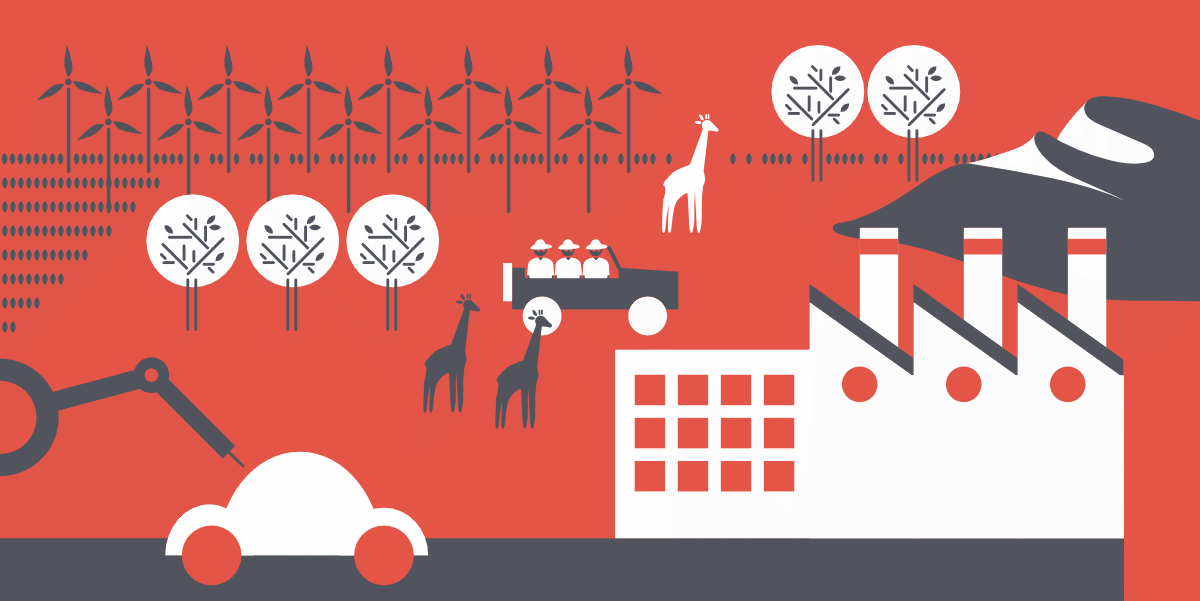Balancing economic growth and environmental sustainability
Several of the Sustainable Development Goals relate to growth. Decent work and economic growth (Goal 8) sits alongside industry, innovation and infrastructure (Goal 9). There are also goals for sustainable cities and communities (Goal 11) and responsible consumption and production (Goal 12). On the environmental side, there are goals for clean water and sanitation (Goal 6), affordable and clean energy (Goal 7), climate action (Goal 13), life below water (Goal 14) and life on land (Goal 15).
Progressia’s natural environment provides most of its population with food. It also provides the resources needed to produce goods and services, and absorbs and processes industry’s unwanted by-products in the form of pollution and waste. At the same time, it is adequate national income that provides the resources to support improvement in people’s lives, socially and economically.
Despite declarations that this is the age of sustainable development, there is a widespread view that economic development and environmental sustainability are incompatible.
The following four scenarios are possible development pathways along which Progressia could advance. Explore the possible outcomes in 2030 below.
Scenario 1 (Good and Good outcomes)
Economic and environmental development outcomes are reconcilable and can be sustained.
Frequently asked questions
What's Progressia like in 2030?
By restructuring the economy around low-carbon industrialisation, alongside other long-term policy shifts, three quarters of the Sustainable Development Goals have been met. There are more jobs, environmental degradation has slowed and carbon emissions are lower.
As well as freeing public resources for a low-carbon agenda, new laws provided safeguards that allowed investments to pour into the energy and manufacturing sectors.
The shift away from fossil fuel extraction had a short-term negative impact on economic growth, but the economy bounced back. And while a small elite who had amassed their fortunes on natural resource extraction caused some civil unrest, the green revolution captured the imagination of citizens from the outset. Young people were closely involved, thanks to increased investment in science, technology, engineering and mathematics education, which increased expertise. This led to a cultural shift towards a green economy and climate-conscious responsibility among citizens.
Unemployment is down from 32% to just 7%. The nature of work has also changed: 70% of the workforce are in formal employment and 24% work in manufacturing. A significant proportion of workers have left primary sectors such as agriculture to join the burgeoning manufacturing industry.
A growing emphasis on processing the goods supplied by primary sectors has created new, higher-value industries refining grains and canning fruits, for instance, as well as adding value to mining products.
Carbon taxes, subsidies for clean technology and production, and the country’s increased participation in the global carbon market, have caused a shift away from coal towards clean energy.
Stanley Malunga, 19

I have a job in a local manufacturing company. I still help my father on the farm at weekends. I earn enough to help my family save for a tractor, which will really help.
The future feels bright for me, for my family, and for my country.
Kike Chilembe, 21

I’ve just returned from three years studying computer science in Germany. I was on a job-bonded government scholarship designed to build and retain science skills. The scheme guarantees me a job.
Together with my friends, one day I’d like to start my own business in Progressia.
Scenario 2 (Good and Bad outcomes)
Economic and environmental development outcomes present conflicting outcomes.
Frequently asked questions
What's Progressia like in 2030?
In an attempt to jumpstart the manufacturing industry, the government invested heavily in upgrading factories, buying high-tech equipment from abroad. But limited skills to operate and repair this machinery meant it soon became redundant.
A sound climate change adaptation policy, carbon taxes, subsidies for industries using clean energy, and the development of clean, low-tech household appliances have contributed to a reduction in carbon emissions and environmental degradation.
However, the high carbon taxes have limited foreign investment. The little money coming from abroad has been invested in natural resource extraction, with no benefit to locals. Skills gaps have been filled with workers from neighbouring countries, and foreign manufacturing companies are leaving the increasingly challenging market.
The rest of the economy continues to be based on mining and agriculture. Progressia remains an exporter of raw materials, failing to develop value-adding processes to maximise income from its natural resources and create jobs.
More Progressians are employed in the informal sector and have few workers rights. Protests are frequent and the government treats dissent with little respect for civil liberties.
While the environmental changes were noteworthy, at least some of these were because of the slowdown in manufacturing. Investment in industry failed to bring about the desired effects. Critics have blamed the government for its lack of a strategic view.
Patience Malunga, 45

The government are obsessed with manufacturing, but they forget that most of us work on the land. They do nothing that helps me, nor my family.
My son joined a protest last year but he got into trouble for it. I tell him to keep quiet and work on the field with us.
Hudson Chilembe, 44

I worked on contracts for Progressian corporations involved in government-subsidised deals to buy equipment and technology.
I hoped that the government’s programme would mean my children had skilled, high tech jobs to go into, but lots of the equipment isn’t used and the jobs aren’t there. I fear they may have to leave Progressia to find good jobs.
Scenario 3 (Bad and Good outcomes)
Sustainable economic and environmental development outcomes are difficult to reconcile.
Frequently asked questions
What's Progressia like in 2030?
Using its location and international links to encourage investment into a low-wage, high-growth economy, Progressia has become a manufacturing hub for the sub-Saharan region and seen its economy grow between 5% and 9% each year since 2017. The manufacturing sector's contribution to GDP has increased from 12% to 32% over the period, and now provides 29% of all jobs.
The Asia-inspired economic boom has centred on promotion by the government of food processing, automobile assembly, garment manufacturing, cement production and chemical processing. Progressia has limited technological interventions in its industries to avert job losses.
However, international bodies and environmental economists have warned that the country’s economic growth is not sustainable because it is based on the heavy use of fossil fuels. They have urged Progressia to make a structural shift in its economic activities to reduce carbon emissions.
These warnings have been met with accusations that former imperialists want to impede national growth through hypocrisy. This view has gained traction in Progressia and in other African countries that admire its growth and ability to take on the developed world.
But a blatant disregard for international climate change commitments has meant that investors have lost faith in Progressia and its products are beginning to be shunned by consumers.
Some have argued Progressia’s increased carbon emissions are a natural part of economic growth. But Progressia’s boom is a short-term one, and its dependence on fossil fuels and a low-wage economy will create environmental, social and economic problems for the country in the near future.
Lucia Malunga, 17

Progressia is much more polluted than I remember when I was a young girl. My grandmother struggles to breathe some days and it’s harder to farm the land.
There’s a new factory near our house; some of my friends work there but I don’t want to. They only want us because we’re cheap labour. In other countries they look after their workers, but not here.
Pandora Chilembe, 43

I work in finance for a car company. We have an assembly plant outside the city. Most of the skilled jobs are outside Progressia; the components are made elsewhere and assembled here. I worry about pollution levels.
Still, the growth is impressive and I’m optimistic that my children will have good jobs.
Scenario 4 (Bad and Bad outcomes)
Economic and environmental development outcomes are simply irreconcilable.
Frequently asked questions
What's Progressia like in 2030?
A series of short-term programmes focused on the sectors that the government thought would kick-start the economy and attract investors: agriculture, mining, industry and tourism. Potential investors saw their short-term nature as a sign of uncertainty. A subsequent lack of foreign investment meant ambitious publically-funded programmes around energy, education and the environment had to be put on hold.
Environmental degradation increased and the country’s carbon footprint grew. Efforts by the Ministry for Environment to introduce policies and programmes to limit climate change have been blocked by other government ministries, who argue that this will hamper investment and development in their areas. The biggest critics of this agenda argue that Progressia needs to spur development using the fossil fuels that it has in such abundance.
Disregard for international climate change commitments made investors even more nervous about Progressia’s ability to stick to agreements. Consumers around the world don’t like the Progressian attitude to climate change. Investor fears, together with consumer boycotts abroad, have eaten away at Progressia’s export industry.
Progressians from all parts of society have become disillusioned. Mass protests, calling for the country’s leadership to step down, are now common. The government response has been to silence its critics by criminalising their actions; arrests and enforced disappearances of dissidents are standard.
International investment would have been more forthcoming for longer-term, low-carbon plans. The government’s failed attempts to kickstart the economy left it with no way to meet its huge environmental and social challenges. Falling back into authoritarianism will only result in unrest and social discord.
Tonderai Malunga, 37

My family have few prospects. Politically, economically and socially, Progressia is divided and nobody seems to know what to do about it.
Years ago it seemed as if my children would have career choices, but now there’s nothing to do but try to survive. In that respect, little has changed, but the climate makes it more difficult than ever.
Ellis Chilembe, 15

My parents always wanted me to go to university but they don’t have much money since my mother lost her job, so it’s looking unlikely. I’m not sure what my future will hold. The economy is a mess and the government are incompetent.
I’m part of a group of young dissidents trying to bring political change but it’s dangerous. One of my friends was arrested a few months ago and hasn’t been heard of since.
